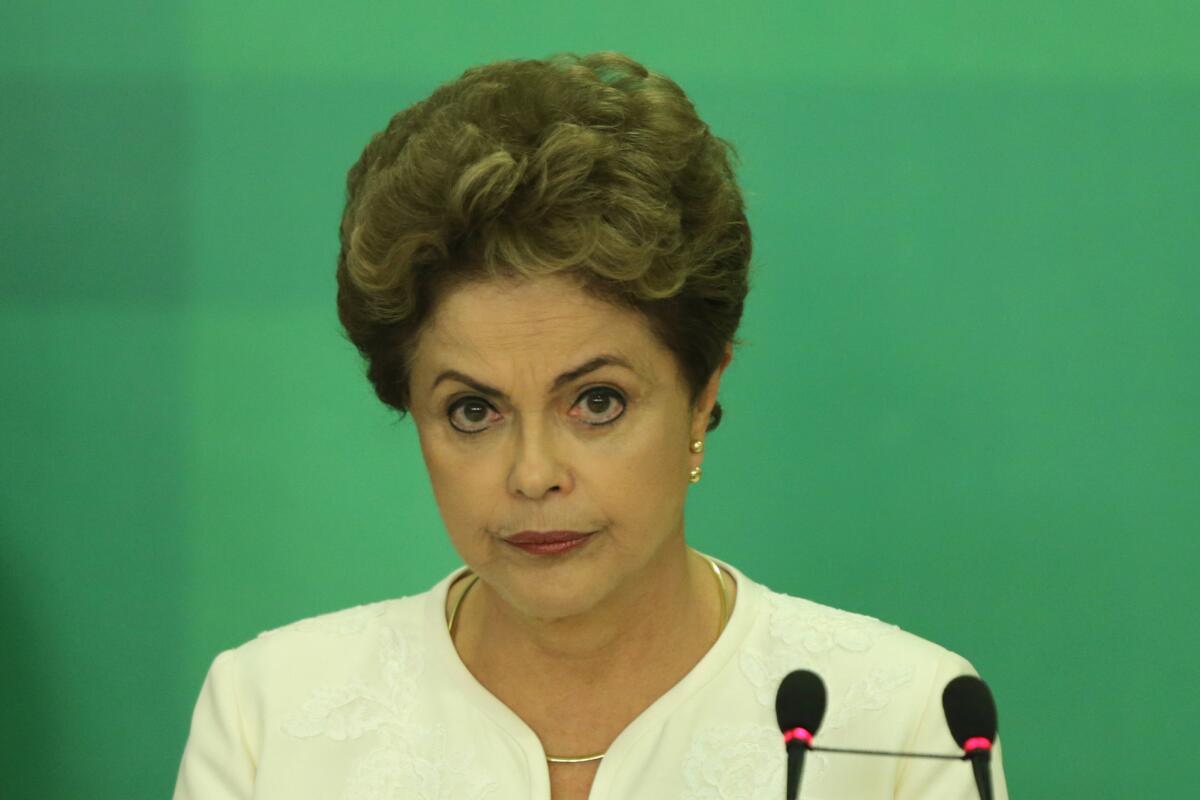Brazil President Dilma Rousseff faces impeachment proceedings

Brazilian President Dilma Rousseff appears at a news conference in Brasilia, the capital, after impeachment proceedings were opened against her.
- Share via
Reporting from Vitoria, Brazil — Brazil’s Congress has initiated impeachment proceedings against President Dilma Rousseff, bringing to a head a political crisis that has plagued Latin America’s largest country since her second term started in January.
Lower house leader Eduardo Cunha on Wednesday accepted a petition against Rousseff based on accusations her government broke budgetary rules.
The accusations must be investigated in Congress, and then impeachment must be approved by two-thirds of the lower house and, after a trial, by the Senate, before Rousseff can be removed from office.
NEWSLETTER: Get the day’s top headlines from Times Editor Davan Maharaj >>
Cunha also faces the prospect of being removed from his post, and some analysts say the move to impeach Rousseff was probably in retaliation against members of her center-left Workers’ Party for supporting an Ethics Committee investigation of the conservative leader on accusations he hid millions of dollars in Swiss bank accounts.
“Facing rapidly dimming prospects for maintaining his seat, the embattled lawmaker has finally decided to pull the trigger in a last-ditch effort to shift the attention to Rousseff,” Joao Augusto de Castro Neves, Latin America Director at the Eurasia Group, said in a statement. The Eurasia Group estimates Rousseff’s chances of staying in office are 60% or better.
The accusations against Rousseff are unrelated to the “Car Wash” investigation, which over the last year has uncovered a complex multi-billion-dollar corruption scheme at state-owned oil company Petrobras and led to the arrests of top business and political leaders, but has not implicated the president directly.
Rousseff, however, has seen her popularity drop precipitously since being narrowly reelected last year. The Petrobras scandal has taken down members of her party, and the country has entered its worst recession in decades.
Only 10% of respondents to a Datafolha poll last month characterized Rousseff’s government as “good,” while 22% called it “regular,” and 67% considered it “bad or terrible.”
Cunha has been named as a person of interest in the Car Wash scandal.
Wednesday’s decision ends a long period of conflict between the government’s executive and legislative branches and follows a week of Machiavellian machinations in which the Workers’ Party had openly debated whether or not to support the investigation of Cunha and therefore risk Rousseff’s impeachment.
Cunha, from the centrist Brazilian Democratic Movement Party, or PMDB, shocked the weakened Workers’ Party when he was elected house leader this year. Though technically in the ruling coalition, the evangelical Christian Cunha clashed often with Rousseff and took Congress in a more independent, conservative direction. The political crisis has worsened Brazil’s economic woes, as the gridlock in Congress paralyzed plans to move forward with budget cuts.
Rousseff denied any wrongdoing Wednesday, implied Cunha’s motivations were selfish and said it was “better” that the period of indecision “paralyzing” the government come to an end, according to Brazilian media.
“No illegal acts took place,” Rousseff said. “There are no rumors that I have diverted public funds, I have no bank account abroad, and I didn’t hide any personal property from the public.”
Bevins is a special correspondent.
ALSO
A shadow hangs over Mexico’s ‘magical city’ of Ocotlan
In Mexico’s Guerrero state, priests are a prime target for drug gangs
Venezuelan opposition calls for investigation of official’s slaying
More to Read
Sign up for Essential California
The most important California stories and recommendations in your inbox every morning.
You may occasionally receive promotional content from the Los Angeles Times.













